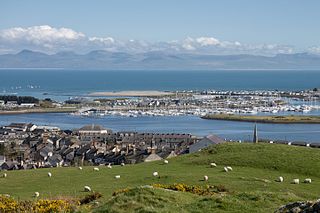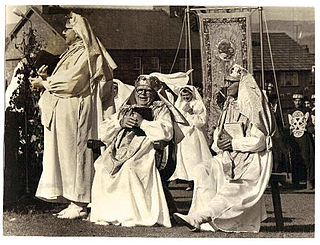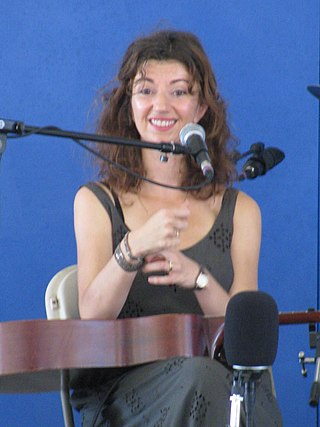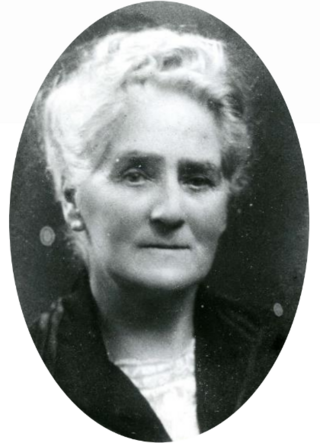Related Research Articles

Dame Jane Elizabeth Ailwên Phillips, known professionally as Siân Phillips, is a Welsh actress. Her early career consisted primarily of stage roles, including the title roles in Ibsen's Hedda Gabler and George Bernard Shaw's Saint Joan. In the 1960s, she started taking on more roles in television and film. She is particularly known for her performance as Livia in the 1976 BBC television series I, Claudius, for which she was awarded a BAFTA and a Royal Television Society award. She was nominated for a Tony Award and Olivier Award for Best Actress in a Musical for her performance as Marlene Dietrich in Marlene.

Kate Roberts was one of the foremost Welsh-language authors of the 20th century. Styled Brenhines ein llên, she is known mainly for her short stories, but also wrote novels. Roberts was a prominent Welsh nationalist. In 1963, she was nominated for the Nobel Prize in Literature by Welsh scholar Idris Foster.

Pwllheli is a market town and community on the Llŷn Peninsula, in Gwynedd, north-west Wales. It had a population of 4,076 in 2011, which declined slightly to 3,947 in 2021; a large proportion (81%) were Welsh speaking. Pwllheli is the place where Plaid Cymru was founded. It is the birthplace of the Welsh poet Sir Albert Evans-Jones.
This article is about the particular significance of the year 2005 to Wales and its people.

The National Eisteddfod of Wales is the largest of several eisteddfodau that are held annually, mostly in Wales. Its eight days of competitions and performances are considered the largest music and poetry festival in Europe. Competitors typically number 6,000 or more, and overall attendance generally exceeds 100,000 visitors, the highest recently being 186,000 attending the 2024 festival in Pontypridd. The 2018 Eisteddfod was held in Cardiff Bay with a fence-free 'Maes'. In 2020, the event was held virtually under the name AmGen; events were held over a one-week period.
This article is about the particular significance of the year 1993 to Wales and its people.
This article is about the particular significance of the year 1982 to Wales and its people.
This article is about the particular significance of the year 1981 to Wales and its people.
This article is about the particular significance of the year 1978 to Wales and its people.
This article is about the particular significance of the year 1975 to Wales and its people.
This article is about the particular significance of the year 1944 to Wales and its people.

Patagonian Welsh is a variety of the Welsh language spoken in Y Wladfa, the Welsh settlement in Patagonia, Chubut Province, Argentina. Patagonian Welsh has developed to be a distinct dialect of Welsh, different from the several dialects used in Wales itself; however, the dialects have a high degree of mutual intelligibility, and speakers from Wales and Patagonia are able to communicate readily. Numerous toponyms throughout the Chubut Valley are of Welsh origin.
This article is about the particular significance of the year 1925 to Wales and its people.

Sir (Albert) Cynan Evans-Jones CBE, more commonly known within Wales by his bardic name of Cynan, was a Welsh war poet and dramatist.

Gwyneth Glyn is a Welsh language poet and musician.

Annette Bryn Parri is a Welsh pianist, best known as an accompanist to opera stars such as Bryn Terfel and Rebecca Evans. Parri appears regularly on the National Eisteddfod stage, and also at the International Eisteddfod at Llangollen.

The Urdd National Eisteddfod is an annual Welsh-language youth festival of literature, music and performing arts organised by Urdd Gobaith Cymru. It is the youth counterpart to the National Eisteddfod of Wales. Arguably Europe's largest youth festival, it is usually held during the last week of May, coinciding with schools' half term holiday. Locations alternate between north and south Wales. The Eisteddfod consists of competitive singing, recitation, art, composition, dance and instrumental events for contestants aged between 7 and 24 years. Regional qualifying heats are held in advance around Wales.

Alice Gray Jones, OBE was a Welsh writer and editor, known by the pseudonym Ceridwen Peris. She was an active temperance campaigner, and a co-founder of the North Wales Women's Temperance Union.
Rhiannon Davies Jones was a Welsh historical novelist, lecturer and Welsh nationalist who wrote in Welsh. Educated at University College Bangor, she won two prizes for short novels, two Prose Medals at the National Eisteddfod of Wales and the crown at the 1973 Anglesey Eisteddfod. Jones published ten novels with her works covering fictional diaries, her political beliefs and responses to political events, and Welsh kings and princes.

Dilys Glynne Jones (1857–1932) was an advocate for the education of girls and women in Wales. The University College of North Wales lowered its flag to half mast on the day of her funeral.
References
- ↑ Live, North Wales (10 October 2005). "'No plagiarism' by Eisteddfod winner". North Wales Live. Retrieved 29 July 2024.
- ↑ "Red Wellies". BBC Wales. 1 January 1970. Retrieved 29 July 2024.
- ↑ "BBC - Gogledd Orllewin - Cae'r Gors". www.bbc.co.uk. Retrieved 2019-07-22.
- ↑ "Home". www.gomer.co.uk. Retrieved 2019-07-22.